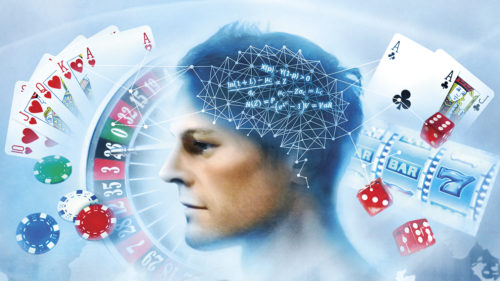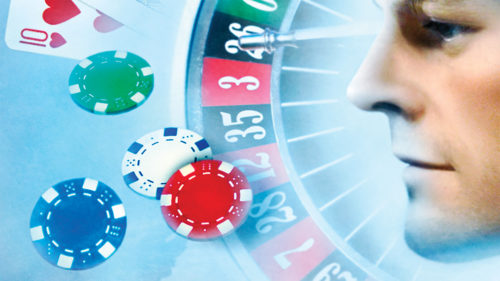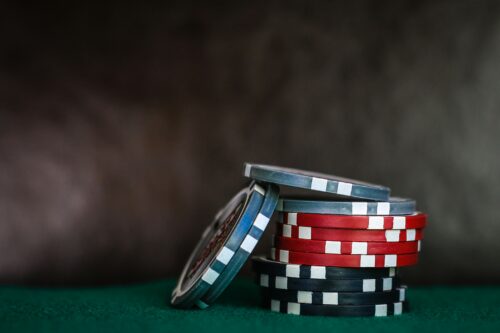
latest
Fictions: Vigorish
Vigorish
Read the fifth instalment in our Fictions series.

Text by Keith Brooke, artwork by Vincent Chong.
Fictions: Health and Care Re-Imagined presents world-class fiction to inspire debate and new thinking among practitioners and policy-makers. To find out about the project, the authors and to read other stories in the collection, click here.
Read the associated “Getting Real” blog, exploring the technology, science, policy, and societal implications of the themes from the story here.
Vigorish
Keith Brooke
“You have a problem, Danny. You gamble beyond your means. You chase losses with increasingly reckless wagers. You suffer mood swings. You view life in gambling terms, to the extent that everything is couched in terms of probabilities, and you have no interest in anything that doesn’t have a price attached. Your personal relationships are blowing up in your face…”
I sit there, ignoring the pings in my earbud and the offers popping up on my lenses – my Bet Buddy smart agent is always busy – and let Dr Sansom talk. I don’t know why I ever signed up for therapy, anyway. Maybe I just thought it was worth a punt.
“It’s a disorder, Danny. It’s treatable. You just need to acknowledge the need for help.”
Gambling. Addiction. I hate labels.
The only reason Dr Sansom thinks I have a problem is that I’m good at what I do – good enough that I don’t need a job – although I know that argument is never going to convince her.
Okay, so I have the occasional bad day, but it all works out. I win more than I lose.
I understand how bookmakers set their odds, and I know how to play them off against each other. I understand the rules. I have a natural sense for probabilities.
I see their algorithms and I raise them my insight.
The trouble is, if I say any of this out loud I’ll just sound like any other gambler with a problem.
*
Your personal relationships are blowing up in your face…
Okay, I’ll give them that one.
A couple of weeks before, when I’d still been living at home…
My mother, standing in the middle of the living room, poised tensely as if she wanted to hug me or slap me or something.
I’d seen that look before. Somewhere on the spectrum between dismay and despair. As if I’m some kind of monster – which maybe I am. A freak, at least.
I struggled to understand what had triggered her look this time. She seemed to expect me to be showing some kind of reaction. Surprise? Grief? Was that what she wanted from me?
I still didn’t understand why I should act surprised. It’s not as if what had happened was unexpected.
“Your grandfather passed away in the night.” That’s what Mum had said moments before.
I should be showing emotion, I knew. That’s what you do. Grandad had been closer to me than just about anyone. He got me. But like I say, it’s not as if it was unexpected. He was in his eighties, and had been ill for years. He was unlikely to see another birthday. I’d have put money on that. I probably shouldn’t have said that out loud though.
Grandad would have helped me work out how to dig myself out of this mess, but obviously not any more. Was that what grief was? Realising the loss of something of value?
It was too late now. The look on my mother’s face had hardened. What was coming next was a pretty safe bet.
“I can’t go on like this,” she said. “It’s too much.”
She didn’t need to say any more. I’m not stupid. She was kicking me out.
That had always been likely to happen sooner or later. I’m not the easiest person to share a house with. My relationships with others do have a tendency to blow up in my face.
Finally, she’d had enough.
I’d have put money on that too.
*
I grew up in a gambling family. My father spent more time with Messrs William Hill and Paddy Power than he ever did with me. Which, on reflection, was probably just as well. The old man was a bad lot, mixed up with local low-lifes and always in scrapes with the police. When he’d eventually taken a punt on a better life away from the responsibilities of wife and son we’d all felt as if we’d cashed in on a bad bet.
Grandad always said I was like my father, and he knew me better than most. He understood how my mind worked, that I saw the world as a series of possible outcomes with prices attached. He said it was in the genes: I had a head for statistics and probabilities, an affinity with systems and their rules, and an eye for a good break. To me, life is a game of weighing up outcomes and playing the odds.
It was a long time before I realised that most people don’t see the world like this. Not long after that I came to see that I was seen by many as a freak – and worse, as cold and calculating. And it took me much, much longer to reach the understanding that my distinctive view of the world gave me an advantage, and could sometimes tip the odds in my favour.
Life can be broken down into a series of choices, and the outcomes of each of those choices has odds attached. I’m good at choices. And when things go wrong, well… For most of my life I’ve been able to play that game – and it was a game, because there was always a safety net, someone to make things better. Grandad. Mum.
But now…
Now shit’s got real.
Now I’m on my own.
*
“I’m okay. Really I am,” I tell Dr Sansom. “I’m sorted.”
Dr Sansom has explained to me about the hierarchy of needs. Nourishment and rest at the bottom, the most fundamental. Security next. Companionship and relationships. Accomplishment and fulfilling potential. I understand the most basic levels, but beyond that, it doesn’t really seem to apply to me. I’ve never needed companionship or a sense of belonging, and I’ve never needed to see myself through the eyes of others in order to measure my own achievements.
But the need for food, water, and somewhere to live, are undeniable.
Shelter proved easy enough. A tailored search agent found me a self-contained bedsit within half an hour of my mother’s ultimatum. I used my Bet Buddy to set up a series of personalised bets on that, too, which nicely tackled the immediate need for income. It’s all about the gamification of life: if you know where to look, you can put money on just about anything these days. Journey time, crossing the road, your own physiological readings, even the behaviour of others. There’s a bet in everything, even when people don’t acknowledge that’s what they’re doing. Like all those people at the gym: they talk of their fitness targets being monetised, but in truth they’re just betting against their own performance and stats.
I ordered pizza as I walked to my bedsit for the first time, delivery estimate 35 minutes. I put some money on that, too, because I knew they hadn’t factored in the roadworks on the delivery route.
I looked around the new place and it was fine. I hadn’t seen it other than in virtuals until then – yes, I’d taken a punt. The place was bare and basic, but okay. I lay back on the bed, checking the day’s outcomes with Bet Buddy. I intended to pay my bills like this. Most days I turn a profit, picking my bets on sports, current affairs, and celebs, as well as on my own activities – dutching outcomes against each other or laying supplementary wagers on exchanges on the dark web wherever I feel I need some bet insurance.
The door buzzer sounded 41 minutes after I placed my order and I won my bet, more than covering the cost of the meal.
That day… The day had been a good one, and in that moment I felt as if I’d lived like this forever.
*
Today was a bad day.
It’s now ten weeks since I moved into my own place, and the balance of good days over bad has covered my requirements. Nourishment, shelter, and yes, even an element of accomplishment.
But today… I did exactly what my therapist had warned me about. I gambled more than the limits I sensibly set myself, chasing losses with increasingly reckless wagers even when the numbers screamed in my head that I should stop. I suffered mood swings. At least I had no more personal relationships to blow up in my face.
I wonder how Dr Sansom knew? I’d only told her part of it. I assumed at the time she had filled in the gaps herself, but now I’m not so convinced.
Was she monitoring me even then?
The bookmakers were, of course. That’s what they do, and that’s why a savvy gambler uses the dark web to cover activities. The bookmakers’ algorithms continually monitor customer activity, looking for telltale patterns. Unprofitable gamblers who only ever take easy gains and need to have their opportunism curtailed. And those who might be open to enticements: free bets and risk-free offers that promise a lot, but only ever serve to draw you deeper. Today’s succession of enticing offers after bad losses has been carefully constructed to draw me deeper; I can see that now. For once, I am a step or two behind the algorithms.
I sit back in my one easy chair and mull all this over. Perhaps today hasn’t been such a bad one after all. Yes, I’ve taken losses, but that’s made me take a step back and think all this through. Allowed me to get a mental snapshot of the interplay of all the systems, the intricate courtship dance as those who want my money try to seduce me.
Today has been a lesson, the culmination of several bad days. A chance for me to adjust my understanding and strategy, just as all the bookmakers’ algorithms are constantly learning and adjusting. It’s like natural selection. Survival of the smartest.
I think again of Dr Sansom, of how even she, a professional, sometimes lets the mask slip and gives me one of those looks of dismay and despair, of seeing me as some kind of freak.
I know now that she isn’t as insightful as I had believed. She is simply part of the monitoring infrastructure. Maybe now is the time I should resurrect one of those wrecked relationships – with my therapist. If she is part of the system, then I should learn more. Get my edge back.
*
“Let us help you.” She smiles.
I nod and she smiles even more. It’s all voluntary, of course. But if I refuse, I know I’ll be penalised by stake restrictions, offer withdrawals, account closures… Because the treatment programme is sponsored by the bookmakers’ trade organisation, and it’s in their interests to make it look effective. It’s all about the numbers.
So I accept her offer of treatment for my disorder, a personalised programme combining behavioural therapy and a health and fitness regime.
It’s all incentivised, of course.
I understand what they’re doing. It’s not about curing me. It’s about feeding my addiction, keeping it at manageable levels close to the brink. Bobbing along so they can milk me dry. I’d seen my Bet Buddy as a valuable assistant, but in truth it combines roles of spy and a devil on my shoulder. Constantly monitoring me and feeding data back to the likes of Dr Sansom, and also dripfeeding those offers, those temptations. It’s a parasite, continually taking me right up to the point of disaster but never beyond.
This new understanding is important. It lets me stay one step ahead.
I play along, for now. It’s my best bet.
I go to the gym on a daily basis, finding ever newer and more gruelling ways to make myself hurt. Buddy takes on the role of personal coach, pushing me to hit targets, finding offers where rewards are triggered when I do so. The irony doesn’t escape me: using gambling to incentivise the cure for my gambling.
It’s easy to game the system. A run of bad days at the gym triggers new incentives to catch up, with lower targets so I have a better chance of success. The algorithms factor this in, of course. They know we try to game the system and so they adapt their models, predicting just how far we will push our behaviour in order to sway the outcome. So you’re not so much betting against your own stats, as against a psychological model of your own thought processes.
I watch the others on the fitness machines too, and wonder for the first time if maybe all these gym bunnies are more like me than I believe. Are they all playing the same game, trying to beat the system, even though the system knows they’re doing this?
Studying them leads to another, more paranoid, thought.
Just how sinister is all this? All of us playing bets that we can keep our blood pressure peaks lower than last week. This is said to encourage healthy choices, but also… it subdues us. Subjugates us. And it’s all free choice.
And I have freely chosen to be subjugated too.
My grandfather once told me, “You’re different, Danny. Not worse: different. And you want to know the meaning of life? It’s how to make the most of that difference, because that’s your advantage. That’s your vigorish.” That’s a gambler’s term: vigorish is the bookmaker’s edge, the extra slice that means the house always wins in the long run. What Grandad meant was that anyone can have that edge, as long as they understand where their advantage might lie.
I’m not going to be subdued, now that I know that’s what they’re doing.
I’m going to find my edge again. My vigorish.
I’m going to beat the system.
*

I spend more time on the dark web these days. Discussion forums where people like me can exchange strategies and opportunities. The exchanges where we trade bets – playing bookmaker to other punters. Most of my money comes from tiny margins: placing bets with the big bookmakers through my Bet Buddy, then finding ways to lay against them on the exchanges. There are betting exchanges out in the real world too, of course, but they’re owned by the bookmakers, and monitored; on the dark web it’s easier to cover my tracks. The algorithms can’t see me there.
So to the outside world, I’m on an epic losing streak, getting drawn ever deeper. But in reality… My bedsit is no longer bare and unloved. I have new furniture, a TV that covers most of one wall, and a top of the range games system – I’m learning that there are ways to monetise online gaming too, not by winning but by placing the right bets.
The discussion forums are strange for me. For perhaps the first time in my life I’m discovering the benefits of that other basic need: companionship. Mostly it’s a means to an end, an exchange of strategy and offers. But it’s strange to finally encounter people who see the world as I do.
“The whole world’s like that, though, isn’t it?” I say, during one late night session. “They say we’re addicts, that we’re being manipulated by the system to get hooked into cycles of reward and debt, as if we’re some kind of freaks. But normal people are just the same. They’re offered credit and they get suckered into a life of perpetual debt. They’re dripfed expectations and ‘needs’, until all they can do is struggle to keep up. Life is always lacking something, and the system has evolved to keep them in that state of need, close to the edge. People like us are no different, we’re just easier to label.”
As I speak, I can see the nods and the likes piling up. I’m saying out loud what most of us have already been thinking.
“The only way we’re different,” I continue, “is that we’re the ones who are beating the system. We’re not addicts, we’re warriors!”
I’ve never had so many likes for a status rant and for a moment, at least, I do feel like a warrior.
It feels good to be beating the odds again.
*
They’ve been monitoring me after all. There’s no escape from it, even on the dark web.
“You have a problem, Danny. You–”
“Yes, I know,” I interrupt Dr Sansom. “I’m an addict.” Saying it out loud is what they want, isn’t it?
But she’s shaking her head.
“No, it’s more than that, Danny. Your problem is you’re too good. Every time the system adapts to your strategies, you find new ways to beat the algorithms. We’ve been watching you, talking to you…”
All those likes and engagements on the dark web… How many had been genuine, and how many had been their spies, watching me and learning? I should have known, but then I’ve always acknowledged that my strength is in numbers and statistics, not dealing with people.
“You’re special, Danny. We can learn a lot from neurodiverse individuals like you.”
Another label. I’ve never liked labels. Never been officially diagnosed as anything other than a freak.
“We want you to work with us, Danny.”
I stare. Of all the outcomes of this exchange, this is not one I’d ever have put money on.
“We need people like you. The anomalies. You’ve taught us so much already. Our development algorithms have been mapping themselves against you, learning from your learning.”
They’ve been using me to fine tune the system that keeps gamblers bubbling away on that level just short of absolute addiction. And now they want me to help them further.
“Work with us, Danny. Help us develop ways to fight addiction.”
Fight addiction… It’s all about definitions: if addicts are those who wreck their lives because of their compulsion, then what are the ones who survive without quite reaching that level?
I’m struggling with this.
I do numbers, not people. Not morals. I can understand the rules that morals dictate, but not the reasons why, so when I’m confronted by a situation where I don’t know the rules, like now, then I don’t know how to extrapolate.
All I can do is ignore the moral angle. Regardless of the right and wrong of what they’re proposing, I know this isn’t really an offer. Turn them down and I’m done. They’ve been watching me everywhere I’m active. My accounts will be blocked, my activities squeezed and shut down. They will leave me with nothing.
So I meet Dr Sansom’s look, and give her that slightly goofy smile that sometimes disarms people.
“That’s good, right?” I say to her. “Helping you to help people? I can do that.”
It’s all I can do.
I’ve beaten them before, for a time at least, and so I reckon that if I play along for now I have a fair chance of beating them again.
Spoken like a true gambler.



